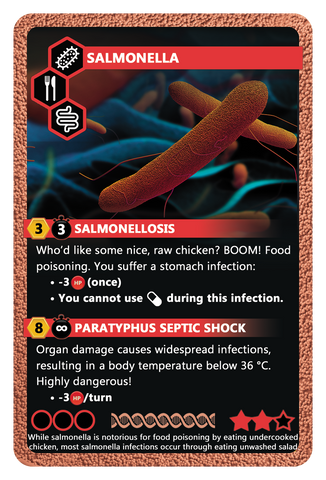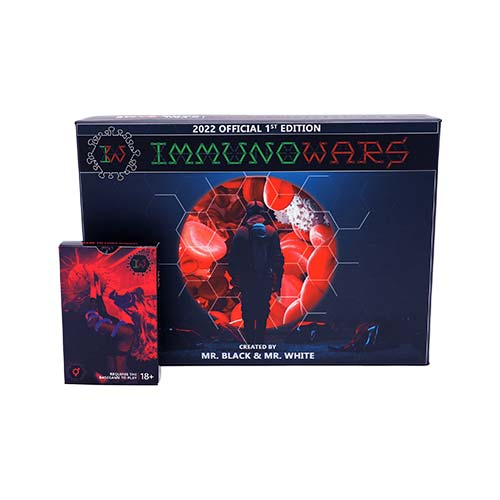Today, we're diving into the dangerous, sneaky, and all-too-frequent realm of Salmonella – the bacterial invader that's crashing your dinner party. Loaded with gripping information and a dash of dark humor, join Mr. White as he fights against this tenacious enemy. Or side with Mr. Black and aid in the spread of this unappetizing microbe? Yuck…
Did you know that Salmonella is named after a scientist and not a fish? Or that these bacteria can survive for weeks on dry surfaces? Strap in, and let's explore the intriguing world of Salmonella and its surprising secrets while our Immunowars heroes engage in fierce combat.
Top 5 Fascinating Salmonella Facts
Hold onto your hats as we reveal some lesser-known facts about Salmonella that'll leave you both fascinated and slightly revolted. Here are the top 5 captivating Salmonella facts, perfect for sharing during your next dinner party or to bolster your mission as an ImmunoWarrior.
1. Salmonella was actually a scientist, what?
Salmonella is often mistakenly associated with salmon or other fish, but its name actually comes from the American scientist Daniel Elmer Salmon, who first discovered the bacterium. So, next time you're enjoying a delicious salmon dish, don't fret – there's no direct connection between the fish and the bacteria!
2. Salmonella in Outer Space
Salmonella is so intriguing that it has even been studied in space! Research has shown that the bacterium becomes even more virulent in microgravity environments. This information is vital for future space exploration and long-term space travel, as it highlights the need for enhanced food safety measures in space.
3. A Survivor on Dry Surfaces
Salmonella is a hardy bacterium, able to survive for weeks on dry surfaces. This fact emphasizes the importance of thorough cleaning and sanitization of food preparation areas, as even a seemingly clean surface could harbor these dangerous microbes.
4. Turtles carry salmonella on their shells
While Salmonella is often linked to contaminated food, it can also be transmitted through contact with certain animals, such as turtles. Many small turtles carry Salmonella on their shells or skin, and handling them can lead to infection. This fact serves as a reminder to wash your hands thoroughly after handling reptiles and other potential Salmonella carriers.5. Salmonella is a global health concern
Salmonella is a global health concern, causing millions of cases of foodborne illness each year. In the United States alone, Salmonella is responsible for over a million infections, 23,000 hospitalizations, and 450 deaths annually. These staggering numbers highlight the importance of food safety measures and education in preventing Salmonella infections.
5 Tips to prevent Salmonella infections
As Mr. Black and Mr. White fight the never-ending battle with Salmonella in ImmunoWars, it's crucial for you, dear reader, to fight Salmonella in your daily life to prevent you from getting infected. Here are some tips to help you keep salmonella's insidious influence at bay:
1. Wash Your Hands Like You're Defusing a Bomb
Remember, salmonella is a cunning and stealthy foe. It can linger on surfaces and hitch a ride on your hands without you even realizing it. Scrub your hands thoroughly with soap and water for at least 20 seconds before preparing food, after handling raw meat, or touching reptiles. You wouldn't want to be the one to unleash a salmonella outbreak now, would you?
2. Keep Your Kitchen Battle-Ready
In the war against salmonella, your kitchen is the front line. Keep it spick and span by regularly cleaning and sanitizing countertops, cutting boards, and utensils. Never mix raw meat, poultry, or seafood with other foods on the same surface. And remember, a clean kitchen is a safe kitchen in the ImmunoWars!
3. Cook Your Food to Perfection
Undercooked food is a hotbed for salmonella, so make sure to cook meat, poultry, seafood, and eggs to the appropriate internal temperature. Use a food thermometer to ensure your meal is cooked to perfection and salmonella-free. After all, a properly cooked meal is a delicious and safe treat for the ImmunoWarrior within you.
4. Beware of Cross-Contamination
Cross-contamination is like giving salmonella a free pass to wreak havoc in your kitchen. Always store raw meat, poultry, and seafood separately from other foods, and use separate cutting boards and utensils for each. Taking these precautions will help you keep salmonella at bay.
5. Get the Word Out
Spread the word about salmonella and its nefarious ways. Share this blog post with friends and family, and educate them on the importance of proper food handling and hygiene. Knowledge is power, and together, we can create an army of ImmunoWarriors ready to take down salmonella once and for all.
Mr. Black's Salmonella Sabotage: Infect and Conquer

In the twisted game of ImmunoWars, Salmonella's infectious capabilities are moderate in Mr. Black's arsenal. With its 0 stars contagiousness and 2/3 stars severity, this bacterium can give your opponents' a nightmare at the toilet , leaving them reeling and weakened.
For just 3 ATP, players can unleash the crippling Salmonellosis or easier said food poisoning, which causes -3 HP and your opponent cannot use antibiotics. The misery intensifies with 8 ATP, as Mr. Black deploys Paratyphus Septic Shock, causing -3 HP per turn for infinite turns and a devastating hypothermia.
Join Mr. Black's malevolent mission as you strategize, infect, and disseminate disease across the ImmunoWars game board. Your opponents will tremble at the mere mention of Salmonella's sinister sabotage.
FAQs about Salmonella
What are the symptoms of a Salmonella infection?
Salmonella symptoms include diarrhea, fever, and abdominal cramps, typically starting 12-72 hours after infection.
How can I prevent Salmonella infection?
Proper food handling, thorough handwashing, and cooking meats and eggs to safe temperatures can help prevent Salmonella infections.
How is Salmonella treated?
Most Salmonella infections resolve on their own. However, in severe cases, antibiotics and supportive care may be necessary.
Can Salmonella be fatal?
Although rare, severe cases of Salmonella infection can be life-threatening, especially in young children, the elderly, and those with compromised immune systems.


